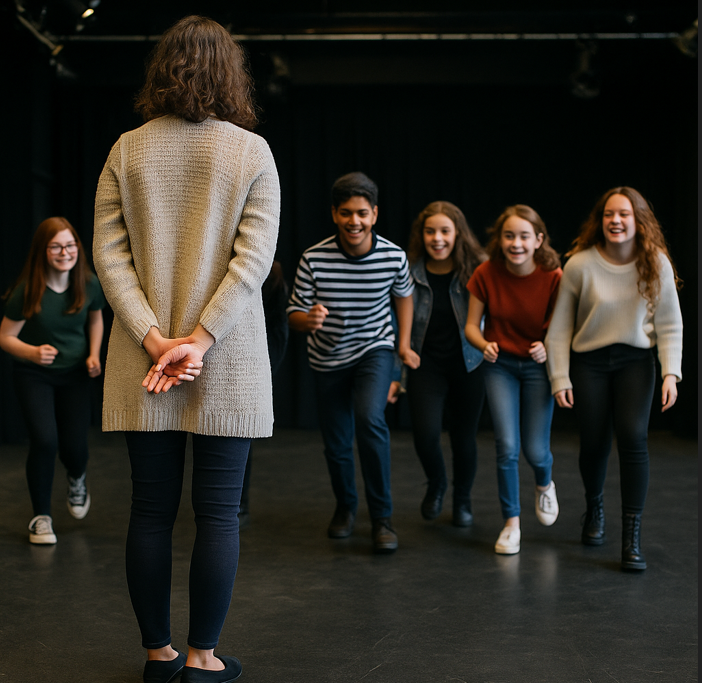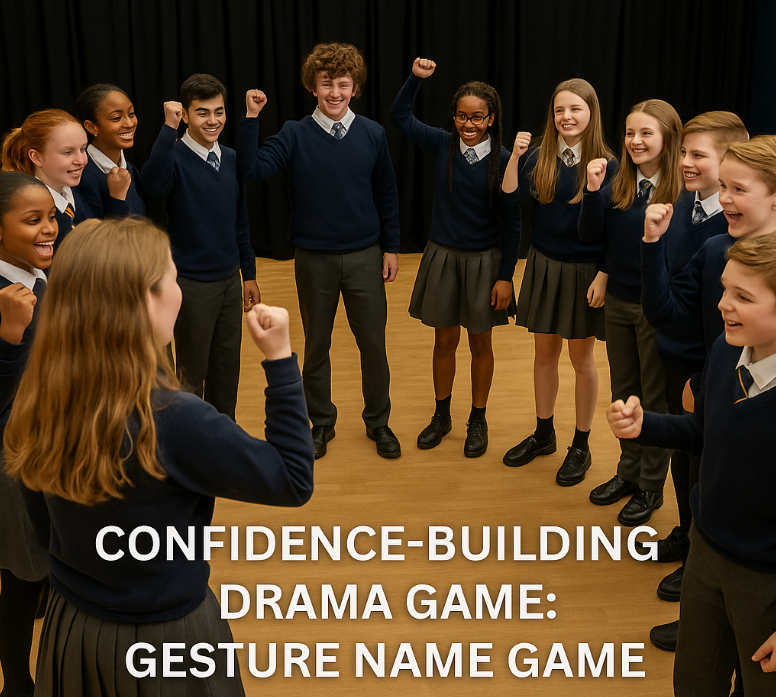Drama games have a special way of drawing out confidence in students, whether they’re young children or older teens. From experience in the drama classroom, I’ve seen how these activities can spark energy in a group and help even the shyest pupil find their voice, although that may take time, so don’t rush it. Building confidence isn’t just about speaking in front of others. It’s about feeling comfortable taking chances, making creative choices, and trusting peers in the space. Here, I’ll share my favourite drama games to build confidence, explain why they’re effective, and give you all some practical tips for making the most of them in your own lessons.

Why drama games help build confidence
Drama games are more than just fun activities. They are designed to create a safe, supportive environment where students can try out new ideas. I often notice that regular drama games help break down social barriers and encourage students to express themselves in creative ways that regular classroom work can’t manage. Simple drama exercises can gently push students out of their comfort zones, which is a vital step towards self-assurance.
Games with clear rules and structure let students focus on what they’re doing instead of thinking about what others might say. Because these activities often involve movement and playfulness, they create a low-pressure atmosphere where even nervous students are willing to try something new. With many games requiring students to collaborate, they also help build trust and empathy but choosing groups in drama can be tricky. However, if done right, these are key ingredients for building confidence in both drama and life.
Key things to consider when choosing confidence-building drama games
Not every drama game works the same way when it comes to building confidence and some that are perfect for a youth theatre setting, may not work in a school setting and vice versa. Here are a few points to keep in mind to set up your students for success:
- Age and ability level: Some games might be too simple or complicated for certain groups. Knowing where your students are at helps you choose games that are just right for them
- Group size: Activities that work great with large groups might not suit smaller groups and vice versa so think about group size before picking your games
- Emotional safety: Only go for games that invite everyone to join but never force it. Creating a welcoming environment makes all the difference and in time, most students will give it a go
- Purpose and focus: Put some thought into your main goal. Are you hoping to build speaking confidence, develop teamwork, or help with physical expressiveness? Match the game to your desired aim
It’s always good to tell students why you’re playing a drama game, so they know it’s about having a go, not about being perfect or clever.

Practical drama games to build confidence
After lots of trial and error, I’ve narrowed down a set of games that consistently get the best response from students. Here are some of our favourites, plus tips on how to run them:
1. Name and gesture
I have everyone stand in a circle. Each person says their name out loud and invents a simple movement. We all repeat the name and action together. This simple, low-stress game gives everyone a chance in the spotlight — and it’s excellent for learning names and melting away nerves.

2. Pass the energy
The group stands in a circle. I start by making a sound and movement, which I pass to someone else. That person repeats and changes it a bit before passing it on. It gets everyone involved and builds unity without too much focus on any individual.
3. Yes, let’s
One student suggests an activity, like “let’s pretend we are gardening,” and the whole group replies together, “Yes, let’s!” then acts it out. This promotes saying yes to new ideas and lowers the fear of judgment. It quickly helps everyone loosen up and enjoy risk-taking.
4. Statues
Students move around the room, freezing when I give a signal. Sometimes I’ll call out a profession, mood, or animal for students to act out as a frozen pose. It encourages physical expression and bold choices.
5. Mirror game
Working in pairs, one student leads and the other follows, mirroring the movements exactly. This exercise requires trust and sharp focus, which, over time, helps build both connection and confidence.
6. Grandma’s footsteps
A classic that never fails to energise a group. One student plays “Grandma” and stands at one end of the space with their back turned. The rest creep forward from the other side, freezing whenever Grandma turns around. It builds physical awareness, timing, and playful risk-taking.
7. Duck, duck, goose
A lively circle game where one student walks around tapping others on the head, saying “duck, duck…” until finally calling “goose!” That person jumps up and races them around the circle. It’s full of movement, laughter, and quick thinking — great for breaking the ice with younger groups.
8. Shopping surprise
In this game, everyone pretends to push a trolley around a supermarket, stopping at shelves to add imaginary items to their basket or trolley. But there’s a twist! Before they begin, each student secretly chooses one person to try to get closer to, and one to try and avoid. No talking, just walking. This is a low-pressure, whole-group game with no single person in the spotlight, which makes it great for anxious or quiet students. It’s also completely ridiculous by the end — students usually end up circling wildly, bumping into shelves (imaginary ones!) and giggling uncontrollably. It’s brilliant for spatial awareness, group dynamics, and letting go of self-consciousness.
9. Simon says
This childhood classic is a brilliant way to ease students into drama without them realising it’s drama. Because they’ve usually played it before at parties or in primary school, there’s a sense of familiarity that takes away the fear factor. It encourages listening, quick thinking, and physical expression – all wrapped up in a simple, fun format. You can adapt it with themed movements (e.g. animal actions, mime-based gestures) to fit your lesson focus.
10. Port / Starboard
Another popular party-style game, Port / Starboard, is high-energy and brilliant for getting the group laughing and moving. One person (usually the teacher at first) calls out ship-related commands – “Port!” (run left), “Starboard!” (run right), “Captain’s coming!” (stand to attention and salute), and so on. There are loads of variations. It’s a fantastic way to build focus, trust, and team spirit – and most students already know the basics, so they jump in with confidence.
Simple games like these spark creativity, encourage participation, and help students step forward with the support of their peers.
Helping shy or anxious students join in
Every class seems to have one or two students who are hesitant to join or take the lead in drama. After years working with quieter students, I’ve learned that a gentle approach gets better results and NEVER, EVER shame students because they are shier than others. We are all different and should be accepted for who we are. Encourage, yes, but shame or embarrass, never!!
Here are a few tips for encouraging engagement:
- Let them watch the first round or play a behind-the-scenes role until they’re comfortable jumping in
- Pair up shy students with friends or people they trust. This makes two-person activities much less daunting than performing in front of a large group right away
- Praise even small efforts, such as simply being in the circle or making eye contact. These tiny victories matter
- Remind everyone that mistakes are not just ok, but valuable. Drama games are all about learning and giving things a try, not about being perfect
With steady encouragement, hesitant students nearly always join in more and more as the weeks go on. Consistent practice beats nerves over time.
I once had a student once who for the first term of lessons, preferred to stand near the corner of the room and would not participate. Gradually, we encouraged her to join in making sound effects, and then holding signs or placards and eventually she was able to say a few lines. She even said later that drama had become one of her favourite subjects, so a little bit of patience and encouragement can go a long way.

Tips for leading drama games with confidence
How you guide drama games is crucial for their success, especially when your goal is to build confidence. Here’s what works for me:
- Be a role model. Always take part yourself, especially when showing a new activity. This makes students feel safe to join in
- Create clear expectations of respect. Remind everyone that there are no wrong answers in drama, and everyone’s ideas count
- Keep your instructions clear and simple. Break things down into small, easy steps so no one gets left behind
- Watch the group’s mood closely. If something’s not working or energy is dropping, swap out the game, switch up the pace, or try something new to lift the vibe
- Have quick group chats after games. Ask how they felt and what they noticed. Sometimes these discussions offer valuable insights for you and the students alike
Setting a tone of shared fun and care goes a long way toward making drama games true confidence builders.
Common challenges and how to work through them
Drama games don’t always go exactly as planned. I’ve seen a few common issues pop up:
- Some students hang back: Rather than forcing participation, I lower the pressure and let them watch until they build up the courage to join. Positive peer energy usually gets them involved soon enough
- Rough group dynamics: If a group isn’t quite gelling, simple ice-breakers or short team games at the start of the session help bring students together
- Trouble keeping focus: Drama can get chaotic. Setting boundaries for play versus listening is essential. I let students know when it’s time for fun and when it’s time for focus
These struggles are quite normal and are part of the growth process. Being patient, persistent, and understanding with students always pays off in the long run.
FAQs
How often should I include drama games in lessons?
Based on my experience, adding one confidence-boosting game per lesson keeps the mood upbeat and lets everyone practice regularly. Over time, this helps students grow more comfortable and sure of themselves.
What if a student refuses to participate?
I don’t ever force participation, but I encourage observing or joining in as a helper. Time and positive experience usually help students feel ready to take part when they’re set.
Are there games for students with extra needs?
Absolutely. Most drama games can be adjusted for smaller groups, or run as partner activities for those who prefer it. I check in with students in advance and make gentle changes to suit different needs, including those with sensory, learning, or physical differences. Inclusive drama is a passion of mine too, having worked in a special needs school. There are ALWAYS things that you can do. The trick here is to really understand your students and tailor things for them! But I find that’s a great way to approach all teaching.
Related posts
How to use Maths in a drama class
Basic acting techniques for beginners


These games are such a fun way to break the ice—I wish I’d known about ‘Mirror Me’ back when I was put into a position to train students using Drama (I was also a student back then!) Simon says sounds especially genius for getting even the shyest kids to participate without pressure.
Have you tried these with teens? I feel like high schoolers might roll their eyes at first, but then secretly love it once they let loose. (Or maybe that’s just me still clinging to my inner dramatic 15-year-old…)
Also, for fellow teachers: What’s your go-to game when you can feel the energy in the room needs a reset?
Hi there. Thanks for stopping by and reading the article and taking the time to leave your comments and thoughts and love that you were involved in drama yourself. To answer your questions, I have used these with teenagers over many years and find that they usually are excited about them. We are all still children after all! My go-to game is probably the shopping surprise one as it’s great fun. All the best. Gail
Thanks for sharing an informative article!
This article offers a thoughtful and practical guide on using drama games to build confidence in students. It effectively highlights how these games create a safe, playful environment that encourages creativity, trust, and risk-taking. The detailed descriptions of specific games and tips for adapting them to different ages and abilities make it very useful for educators. The emphasis on patience, emotional safety, and inclusivity, especially for shy or anxious students, is compassionate and empowering. Overall, it’s an engaging, well-rounded resource that balances theory with actionable advice, making it valuable for anyone wanting to foster confidence through drama.
Keep up the good work!
Hi SJ. I’m so pleased you found the article useful and informative. I’ve been using these games for years and they never fail to help students to get started with drama and are great for breaking the ice with new classes. I intend to ‘keep up the good work’ as you say so please do come back and read more. Take care, Gail